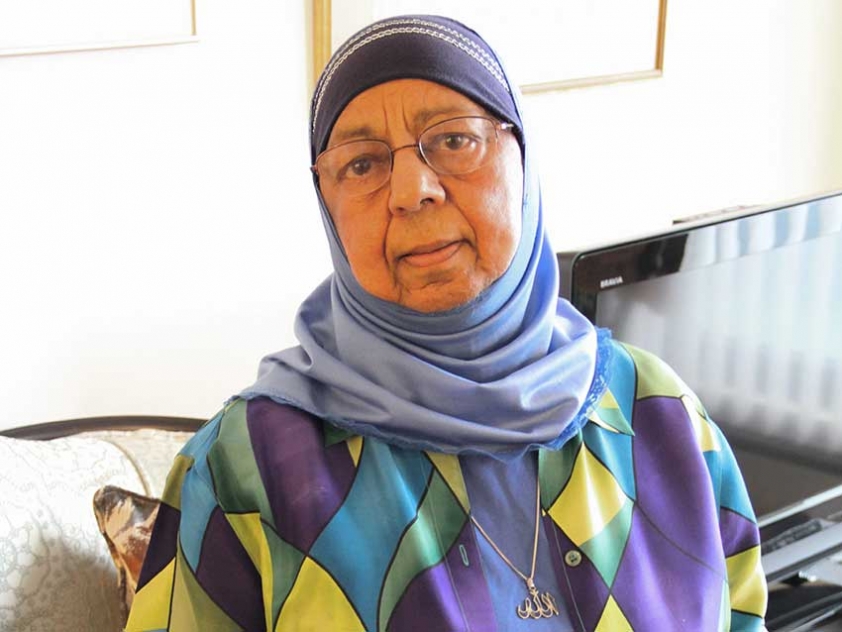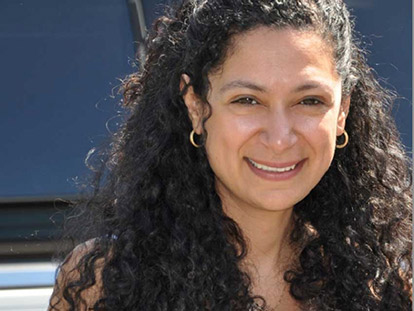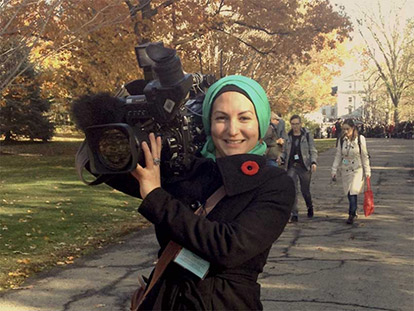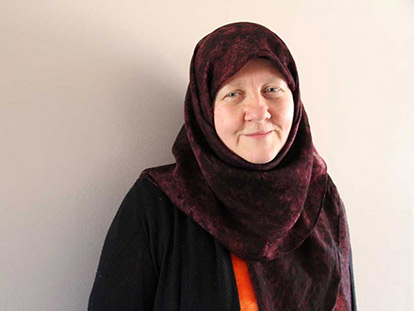 Khadija Haffajee is an Ottawa-based Muslim community activist.
Khadija Haffajee is an Ottawa-based Muslim community activist.
Jun
Khadija Haffajee: The Journey of a Muslim Canadian Activist
Written by Khadijah VakilyIn the Ottawa community, it's a challenge to meet someone who does not know Khadija Haffajee. She is seen as a pioneering figure in the nation’s capital, as well as on a global scale as a lecturer, educator, mentor and social activist. But not everyone knows the unique backstory on how a South African woman ended up holding such a public role in Canada.
Born to a child bride who had 13 children, only 6 of Haffajee’s siblings survived infanthood. She grew up during apartheid, a factor that still weighed heavily on her daily interactions once she moved to England seeking employment in the ‘60s.
“I used to worry about whether somebody was going to tell me to leave because I’m brown. That kind of stuff I got over in England, I didn't have it when I came to Canada. I kind of resolved that issue and came to terms with that,” says Haffajee.
After arriving in England, she had an interview the very next day and was promptly hired as a schoolteacher. Despite some of her coworkers finding the job challenging, Haffajee was able to run her classroom with a firm hand.
“I'm a tough cookie,” says Haffajee.
Though she initially taught secondary school, she soon moved on to a elementary school which she found to be an easier teaching environment. For two years she continued teaching. However, the constant grayness and dampness of the British landscape began to depress her.
“The weather did get to me (…) I don't care how cold it is in Canada as long as I see a blue sky, give me a blue sky and I’m fine,” says Haffajee.
Knowing that returning to South Africa was not an option she wanted to entertain, she decided to move to Canada, coming as a government sponsored immigrant in 1966 and quickly paying back the money within a year of working.
“I didn't come to study, I came to work. I was not married, I had my own life to lead, so I was very different in the 60s,” says Haffajee. “This was the 60s (…) now they look at me and they say ‘this old lady with a hijab on, what does she know?’”
Her qualifications were accepted in Canada, but she arrived in April, smack dab in the middle of the school year. There were no jobs available at that time of the semester in Burlington, Ontario. She would be granted a position in September, but her current options were limited. She turned down an offer to be put on the list for supply teachers in the meantime, finding the prospect too hard to manage as she did not drive.
“I thought, I have to be busy, what am I going to do from April to September? So I went and I became a live-in housekeeper, with an extremely well-off and beautiful family. It was not the usual trend, because I was not married when I arrived here, young and adventurous,” says Haffajee.
The family, despite the stereotypes associated with their upper class status, was polite and welcoming, treating her as a member of the family, taking her on vacation with them and making sure the kids were well-mannered and respectful.
“So my introduction to Canada was a very unique experience, in terms of who I met and what happened,” says Haffajee.
Reflecting on her past, Haffajee sees these experiences as playing an important role in her own personal development.
“It’s who I am, I’m not just this person in Ottawa who everybody knows, they all don't know me really, they just see me (as) I’m a public figure,” says Haffajee. “The other aspect of it is was (when I first came here) I disliked Muslims. I did. I didn't like Muslims at all because of my own personal experiences in terms of South Africa.”
In South Africa, it was typical for Muslim families to forbid their girls from attending school, a practice Haffajee calls unIslamic but unfortunately commonplace.
“I was the only Muslim girl in my class, I had no Muslim friends throughout high school in South Africa because there weren't any in school. And so I wasn't comfortable with Muslims, and then I left so I still didn't have connections, I couldn't connect at all,” says Haffajee.
Because of this, Haffajee was what she calls a “not-completely-committed” Muslim, doing her best to follow some of the basics like praying and fasting, but not initially wearing hijab or reading Quran.
In Canada, she still had not been able to get past her misgivings about the Muslim community. It was only after a visit back in South Africa, when a family acquaintance mentioned how happy Haffajee’s mother would be if she could make some Muslim friends, that Haffajee promised to give it a shot.
In 1968, the Muslim Students’ Association (MSA) held a conference in Hamilton at McMaster University. By then Haffajee had slowly become friends with a few Pakistani families, and was invited by one of them to come to the event. After her previous negative experiences, Haffajee was hesitant to attend.
“I went and Subhanallah, that changed my life. Because it was the first time in my life that I heard highly educated—this means Western-educated—Muslims speak positively about being Muslim. I'd never met them before. My father was one of them but I didn't know him, he died when we were young. So this was the first time, and I thought there must be something in this religion that I missed out completely,” said Haffajee. “So when we got home that evening, I thought I have to do something. So I took a bus to Toronto and I bought me a Quran. And Alhamdullilah Allah made it easy for me (…) and after that I never missed a lecture, any opportunity that I could get to go hear somebody speak, I went. My whole life was focused, like I had to do this.”
The following year, an MSA conference was being held at Carleton University, where Haffajee was introduced to the Ottawa crowd. She moved to Ottawa at the end of the school year, and started attending prayers at a makeshift mosque located within a small home-what would eventually become the Ottawa Muslim Association (OMA).
It was here that she began to truly get involved with the Muslim community. At the same time, Haffajee was a teacher with the Carleton School Board, now known as the Ottawa Carleton District School Board, and was also involved in the teachers’ union and served as an executive. She was used to living alone and had her own apartment, working to pay her bills and continuing to play a role in the religious community.
“Because I wasn't shy, I wasn't worried about anybody else, I did my own thing in the mosque so the brothers were very good to me in Ottawa. They accepted me. I was running elections for them, really involved in the mosque in that sense,” says Haffajee.
She was elected Treasurer of the Ottawa Muslim Association in 1976, and was soon participating in the Ottawa Muslim Women's Auxiliary, eventually rising to the role of president.
“It was kind of very rudimentary when I arrived. There weren't as many immigrants at that time, and people were younger and trying to establish themselves and didn't have the time—and I had the time. And I loved it! It wasn't like I was forced to do it—I enjoyed doing it so I really became whole-hearted into this community stuff in the 70s,” says Haffajee. Once she became president, she wanted the group’s focus to shift from a social to a more educational approach.
“I decided that we should be doing something different, so I started really getting the women organized and improving their Islamic knowledge, having talks, those kinds of things,” says Haffajee.
The organization raised a lot of funds for the mosque, buying supplies and furniture. A fundraising cookbook that the group worked on and first put out in 1974 became surprisingly popular, with individuals from as far away as Iceland seeking to purchase it.
“Even just the other day someone wanted it, in Paris someone had seen it. It helped a lot of people who were students,” recalls Haffajee.
She then became involved with the Council of Muslim Communities in Canada, travelling as a woman's rep for them and the MSA across the country.
After conducting a survey of Muslim women across Canada, Haffajee found that for most females who were socially active in their Muslim communities, they were only active on a comparatively minor level in the Canadian community at large.
“I wanted them to go out, and not just do madrassa stuff. That was my big aim, and that's what I did when I went to speak all over, to encourage them to become involved in the community at large,” says Haffajee.
Over the decades, she was invited to Malawi and Zimbabwe to train young Muslim women and worked on location with Afghan refugees in Peshawar during the Soviet War (in 1986) and within Afghanistan with an interfaith organization in 2003. As is evident in her work, the main focus of a lot of Haffajee’s efforts has been trying to make Muslim women become more involved with the general public.
“I really would love to see that we have to have Muslim women's voices in all mainstream organizations,” says Haffajee.
As a testament to this sentiment, Haffajee herself has served on the board of the Children's Aid Society, was one of the founding members of the interfaith organization Women for Peace, was a board member of the Multicultural Advisory Committee at the Children’s Hospital of Eastern Ontario, provided spiritual care in secondary schools and the Multifaith Housing Initiative, as well as belonging to the Religions for Peace-Canada movement.
“I go places because I want to go, I don't go to please somebody or because somebody else is going. I go because I think it's important. You'll see me there even if there's nobody else because I want to go. This is part of who I was, as I said I'm not an Easterner, I wasn't raised in the East. I was raised in the West, I'm South African,” says Haffajee. “This activity that I do is not new for me, I was doing it when I was in South Africa. I was very very involved with women's things in South Africa, with educating girls in South Africa, because education's not free. We were raising money for bursaries; I was always involved. It's nothing new in a way that I've learned when I came here.”
Some of the obstacles Haffajee faced while following her aims for community involvement came on multiple fronts.
“I think the challenges were twofold. Some women weren't interested, which is fine, if they're not interested then I didn't bother them, but I felt I had to encourage them, and if they're not responsive then they didn't have to come. But at the same time I made sure they didn't stop other people from doing it, because (…) you can't impose that and stop people from doing the work they do. The second thing was getting the men on-side and that was difficult to do,” says Haffajee.
Haffajee has never been one to back down on an issue, and working within some predominantly male environments has not changed that fact. She recalls getting obscene phone calls and hate mail, simply because she was a Muslim woman in a public role. What bothered her more than this, was seeing some Muslims turn the other cheek when their fellow males were involved in shocking incidents. She recalled an instance where a member of the community was supported rather than condemned for being part of domestic violence.
“They knew he was an abusive husband and they didn’t do anything. He was always being chosen as the president of this and the president of that, and I mean, I have no respect for that because you have to have a certain standard,” says Haffajee. “And it doesn’t matter whether it's a woman or man, if they're not abiding by that standard, they don't have positions of responsibility, period.”
Despite being involved in so many organizations and committees, Haffajee balanced her community work with her teaching job, teaching on weekdays and limiting most of her other work to weekends.
“My principal was very good, I would leave early on Friday afternoon, so I could fly to Edmonton or Vancouver and come back late Sunday night. But that was my advantage, I had no family so I could do that,” says Haffajee.
Eventually, that situation changed in 1990, when Haffajee agreed to an arranged marriage with Dr. Mazhar Hasan.
“I told him I wouldn't marry him if I couldn't do what I was doing. If he felt that he wanted a wife to be at home all the time, I didn’t want to marry him,” says Haffajee. For five years, the couple commuted between Chicago and Ottawa as Haffajee steadfastly refused to move to the United States. Eventually, her husband joined her in Canada.
“I had a heart attack in the middle of it all. I went back to work—my husband said not to but I said let me try. I went back to work and they were very good to me because I went part-time, every other day. But my health was not good; I ended up in the hospital a couple of times and then my husband said this is it. So I took early retirement. And then I stopped my activities, because I was sensible enough to realize that if I really wanted to continue I had to stop completely and get better, and then I could resume. So I just said I was out of circulation. And then when I felt strong enough I picked up my reins of what I was doing,” says Haffajee.
In 1997 she was the first female elected to the Majlis ash Shura of the Islamic Society of North America (ISNA), and continued there until 2008. “The men didn't know what to do with me,” she laughs. “It was interesting because they didn't know who was going to sit next to me at the meeting…they were only used to women who were secretaries.”
Haffajee also become a member of the Board of Directors for the Council on American-Islamic Relations – Canada (now the National Council of Canadian Muslims).
Haffajee had additional health problems that required her to have triple bypass surgery, forcing her to ultimately resign from her historic role.
It was during her illness that Haffajee got the idea of starting Expressions of Muslim Women, a local group of Muslim women from the National Capital Region, dedicated to showing the creative work of Muslim women. The event has been running for over nine years.
She reached out to the women she connected with at her halaqa that had been running for over 40 years, as well as her women’s book club.
“I sent an email to all these young women that I knew. And I said I have an idea but I can't do work anymore, so please if you're interested in doing something new, come, I'll tell you about it. I’ll be here, I won't work and I won’t interfere, and that's how EMW was formed. So all the girls in the committee, they were my girls so to speak,” says Haffajee.
Though she is not as involved in community work, Haffajee still works to balance her personal life with her interest in the world around her.
“I think my husband is very supportive of what I do. He’s supportive, but he doesn’t want to know all the stories” she jokes, adding that he now dutifully comes with her wherever she goes.
As for what the future holds, Haffajee may seem to still have her fingers in many pies, but she is actively taking a backseat to allow other individuals to come to the forefront.
“I really feel now that it’s a new generation, and we really need to give the new generation a chance, so that’s one of the reasons that I’m not as involved,” says Haffajee.
She recalls the words of Gloria Steinem, who decided not to attend the UN’s Fourth World Conference on Women held in Beijing in 1995 (a conference where Haffajee herself was representing Canada). Steinem sent in a letter explaining her absence from the event.
“She said ‘I did not come, because if I had come, you would not have listened to the younger voices,’” said Haffajee. “And I thought that’s so true. Because everybody knows her, and everybody would want to be there to listen to her. And you forget that people are coming up, you have to make room. And if you’re going to keep staying there, it’s not going to happen. You have to practice what you preach.”
This article was produced exclusively for Muslim Link and should not be copied without prior permission from the site. For permission, please write to info@muslimlink.ca.















